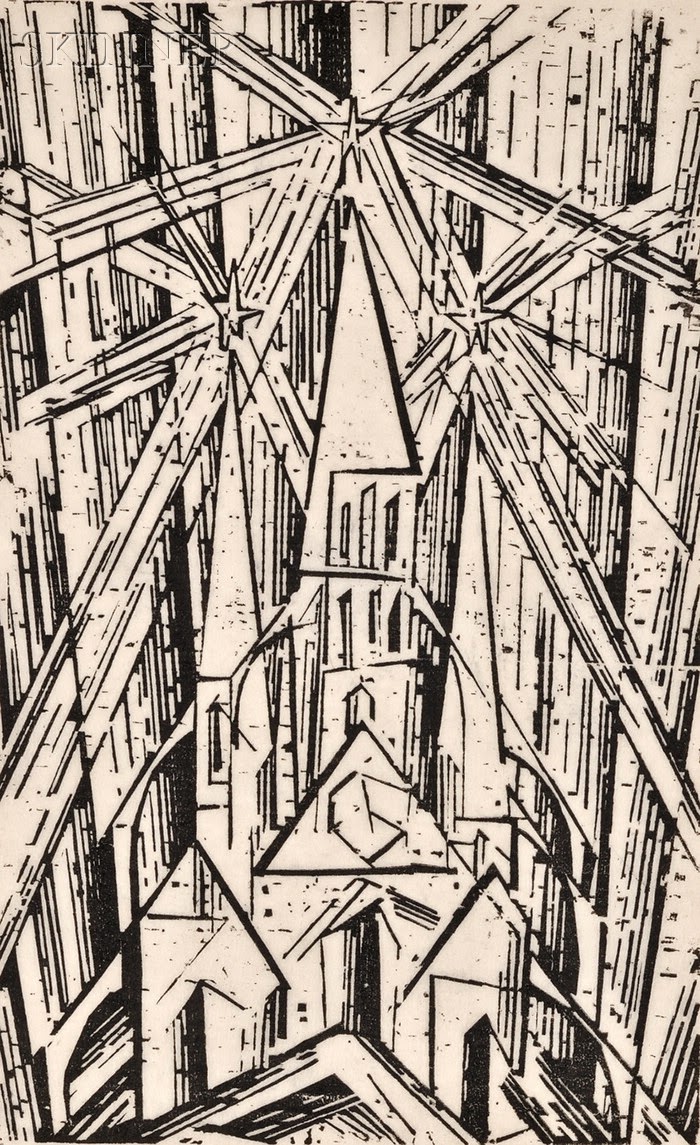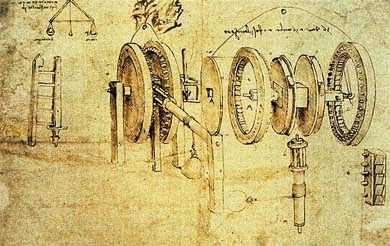Medieval History
I have been writing a review of Medieval Modern; Art Out of Time by Alexander Nagel and have thus been thinking a good deal about meetings of the minds across temporal divides, and (because it is summer, and I am grateful for the time to actually really think with all of the wonderful people past and present engaged in this endeavor of searching and researching and writing) meetings of the minds in general. This book, for me, joins the great work of Bruce Holsinger's Premodern Condition and Amy Knight Powell's Depositions in opening up period boundaries and exploring, as Nagel says it so well, "a dizzying pattern of recursions" (273). The image I have here, which also graces the cover of Nagel's book, makes me marvel at how the Middle Ages became a time whence future time could be thought, indeed, envisioned. It also makes me wonder about the process of separating form and content in the radically secular Bauhaus's embrace of religious architectural process. And it unnerves me to think how easily (in the early 20th century. Today?) an image of a cathedral (an oppressive image to so many) could become a utopic image. There are many ways to think of the inheritances and legacies of the Middle Ages, complex and multivalent as they are, and I'd like to think for just a little bit on how collective rethinking can be a reshaping of the period - as well as how the collective we have come to call the Middle Ages shapes us, we who have never been just modern.
How a collective comes together (to build a cathedral, a barn, a school of thought, a discipline) is itself a process of assemblage that can be treasured by memory/history and loved in language, all the while never being fully understood or predictable. Karl Steel and Jonathan Hsy have recently shared fantastic collectivities - click here for one including a "superfluity of nuns" and here for another celebrating a "fellowship of Tolkienists." Angie Bennett Segler wrote a declaration of "radical hospitality" that, along with the post from Eileen Joy that she cites, has been inspiring me all summer. Mary Kate Hurley invites feedback (literally! you can do so until July 10!) on "Creating Alternative Communities" in an age and within an academic institution that does a whole of individuating and isolating. And the Material Collective gladdens to new writers keeping (to me) that most wondrous of collectives, that between art and humans, decidedly "strange." I gather all of these collectives in my thoughts and on this page now in a luxurious (and kind of wonderfully disorienting) moment of self-awareness, typing away in the quiet of my building in the middle of my town ensconced in corn fields in Indiana. As the Material Collective had voiced during the "Impossible Words" session at Kalamazoo, "a collective cannot see itself in its totality." For some reason, right now, it's very thrilling to me to think of so many people in such disparate places striving in so many different ways towards/with things medieval. I think of Ian Bogost's discussion of exploded diagrams in Alien Phenomenology - all of the medievalist collectivities I've listed here (and many and any others) are themselves parts apart, but also take this thing called the Middle Ages apart. The cathedral need not loom so large. The medieval period sits in the perpetual potential of the exploded diagram we constantly redraw for it.
And so to end (quickly because, summer, pool, children) by asking the reverse. If modern shapes the medieval, how does the medieval shape the modern? Nagel, Holsinger, and Powell are asking exactly this question. Jeffrey Cohen asked it of the medieval eco-criticism panel at Kalamazoo this year in asking after points of contact between modern theorists and medieval ones (and ideas and scenarios and images). I find that I asked the question in my review of Caroline Walker Bynum's Christian Materiality and Mary Carruther's The Experience of Beauty in the Middle Ages at Different Visions. I guess that I'll end with that today:
- Reflections On "e-medieval"
Last week, I noted the release of the most recent issue of Literature Compass, which is a collection of articles around the special theme "E-Medieval: Teaching, Research and the Net." Since last week, I've been reading through...
- Blogging, Tweeting, And Publishing
I've been asked by JJ Cohen of In the Middle to compose something on the creation of my blog and my adventures in tweeting for an article he's working on. The article will appear in a book centered around Geoffrey Chaucer hath a Blog, in...
- Parchment, Echo, Nature?, Epochs?, Bristles: Contact Ecologies, 2013
Yes, again.I return to Brueghel's Tower of Babel after a conference, this time, in the echo-chamber of the upper reaches of the Tower, whence attempted contact with the divine stretches, and where I can position myself to think (all too briefly) on...
- Swerving Into The Fray
Mandeville writing, British LibraryThis will be a brief swerve as end of the semester mayhem calls, but in honor of the charivari of saint Nicholas Day (when the lowly young clerks ran the show for a day in the Boy Bishop festivities), and in honor of...
- Come Up To The Table
BN ms.fr. 2810, fol. 136vLast day of "Monsters and Marvels" activity (great presentations on the collaborative writing of Monsterfestos done through Facebook and GoogleDocs) - and so a celebration with a medieval menu based on the class: for Beowulf:...
Medieval History
"Cathedral Thinking" - on collectivity
 |
| Feininger, Cathedral of the Future, 1919. |
 |
| Exploded diagram by Leonardo da Vinci |
And so to end (quickly because, summer, pool, children) by asking the reverse. If modern shapes the medieval, how does the medieval shape the modern? Nagel, Holsinger, and Powell are asking exactly this question. Jeffrey Cohen asked it of the medieval eco-criticism panel at Kalamazoo this year in asking after points of contact between modern theorists and medieval ones (and ideas and scenarios and images). I find that I asked the question in my review of Caroline Walker Bynum's Christian Materiality and Mary Carruther's The Experience of Beauty in the Middle Ages at Different Visions. I guess that I'll end with that today:
Many of the revelations of agency and materiality being developed in contemporary theory were active in the Middle Ages, and medievalists have much to share with modern thinkers struggling through the economic, ethical, and social problems of inert materiality and deadened physicality.
I was prompted to write this entry, I realize now, not so much because of the review that is being written, but because of the collectivities that I find myself reading with and within. I feel boundless gratitude for them, and the friendship and momentum and meaning they generously offer. And so, an effort at the first draft of a book review has become a love letter. Thus it goes.
- Reflections On "e-medieval"
Last week, I noted the release of the most recent issue of Literature Compass, which is a collection of articles around the special theme "E-Medieval: Teaching, Research and the Net." Since last week, I've been reading through...
- Blogging, Tweeting, And Publishing
I've been asked by JJ Cohen of In the Middle to compose something on the creation of my blog and my adventures in tweeting for an article he's working on. The article will appear in a book centered around Geoffrey Chaucer hath a Blog, in...
- Parchment, Echo, Nature?, Epochs?, Bristles: Contact Ecologies, 2013
Yes, again.I return to Brueghel's Tower of Babel after a conference, this time, in the echo-chamber of the upper reaches of the Tower, whence attempted contact with the divine stretches, and where I can position myself to think (all too briefly) on...
- Swerving Into The Fray
Mandeville writing, British LibraryThis will be a brief swerve as end of the semester mayhem calls, but in honor of the charivari of saint Nicholas Day (when the lowly young clerks ran the show for a day in the Boy Bishop festivities), and in honor of...
- Come Up To The Table
BN ms.fr. 2810, fol. 136vLast day of "Monsters and Marvels" activity (great presentations on the collaborative writing of Monsterfestos done through Facebook and GoogleDocs) - and so a celebration with a medieval menu based on the class: for Beowulf:...
